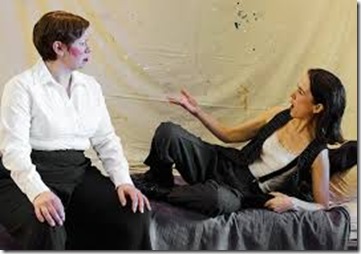The Dumb Waiter: Duckworth and Pinter struggle at the Avalon
Photos: Richard Ellis .
NOTE: My original review disappeared on line before I had a chance to save it. This is a reconstruction of the main points which I feel were necessary to publish,
The Avalon Studio acting space worked very well this time as it represented a closed basement area where Gus (Ellis) and Ben (Watt) are waiting for their instructions.The fact that director Todd Duckworth engaged two female actors to play roles usually performed by males is of no consequence at all.
First jarring moment: Gus’ comic dance as she struggles to get her boots on. This could be seen as a Pinter style nod to Estragon in Beckett’s Godot where Estragon carries on for a while trying to remove his shoe (Aide-moi à enlever cette saloperie – Act I ) . However, Godot, as Beckett says, is a clown show whereas The Dumb Waiter certainly is not.
The director and actress read that first scene much too literally. It would seem to be an ironically pathetic struggle with a simple problem that overwhelms Gus. It shows she is a simple person who can’t handle a simple reality like putting on her shoes. In fact Gus is constantly struggling with all the reality around her: (Who rented the room?, what about the dishes? No matches???). None of this bodes well for poor Gus. It shows us early on that she should have been intimidated by Ben’s cool aggressive way of shooting her disapproving gazes and ordering her about. Or even ill at ease in front of this colleague who reads the paper , makes banal remarks and pays no attention to her, preferring to tell anecdotes that have no meaning for Gus. In fact, the whole hierarchy between Gus and Ben is set in place in the firsts few minutes of the play as we see who is boss and who is set up in a subaltern position but Gus’ clown show destroyed that because it put both characters on an equal footing. That throws everything off balance. Mary Ellis’ character kept fooling around, joking and nervously enjoying herself. . She never felt tense, threatened, or even uneasy because of Ben and that sent the spectators in the wrong direction from the start.
.
The shift comes with the arrival of the Machine – a silent dumb waiter (well installed on the set that enters with much clatter and vibrating) which has an enormous effect on this relationship, as the intervention of third parties always does in Pinter’s theatre. Ben reacts with fear and panic and lashes out in anger at Gus, because suddenly she realises she is no longer in charge. She has lost her power! Ben is in the same position now that Gus was before the Dumb Waiter arrived – deferent and subservient – but we did not understand that because according to this staging both Ben and Gus were on an equal footing. After the Dumb Waiter enters their lives, Ben’s relationship with the world changes . Ben turns into a violent and dangerous killer capable of betraying her friend. !!!!Ben talks through the speaking tube and obeys orders completely because she now has to please the one who dominates her , the one above who is now charge.
What director Duckworth tries to do, apparently is work on contrasting acting and emotional rhythms. Watt was slow, deliberate, cool, silently aggressive at first, then openly aggressive at one moment. Ellis was agitated, comic, extroverted, and very physical the whole time, only at the end did she calm down a bit because she sensed something was not right. But that was too late. The hierarchical relationship between the two never had a chance to build and they certainly never exploited all the elements that the text gave them. It was extremely disappointing.
I felt that Kristina Watt as Ben was extremely good, she used her face, her eyes, and her body in a very precise way , suggesting there was something cold blooded in her gaze. I even felt that at times, she was instinctively trying to elicit another kind of response from Mary Ellis because she felt this was not quite going as it could. Mary Ellis, an excellent actress, appeared to be imprisoned in this character that did not work.
The problem with the staging was that it did not build up the different moments in the relationship to justify the twist in the middle and the conclusion at the end. There was no growing tension, no sense of threat, of foreboding , no situation that becomes more and more difficult to bear as the relationship between them shifts. We felt none of that. As a result, Ben’s changes in mood made no sense and the final scene as it was played, made no sense. This brilliant play expresses such a complex idea of how little by little, fear is installed through a process of domination among human beings and yet it illustrates this process using very simple theatrical means. Even the language is alarmingly simple and since all the meanings are deeply set in that language , nothing can be taken at face value. They have to be dug out as it were and the idea of an overtly comic reaction of the first degree, set off a serious misreading of the whole text right from the beginning. A bit of a shame.
The Dumb Waiter by Harold Pinter
Directed by Todd Duckworth
Set: Graham Price
Lighting: David Magladry
Costumes: Vanessa Imeson
Cast:
Mary Ellis Augusta
Kristina Wall Benita
March 21-23 & 28-30
7h30 + 5pm Matinees on Saturdays
Call 613-236-1425
